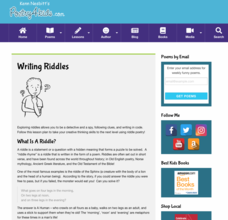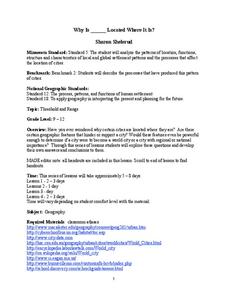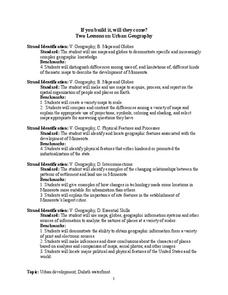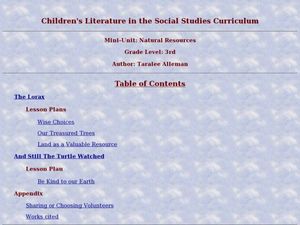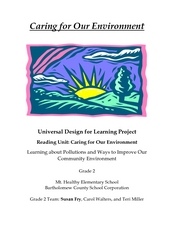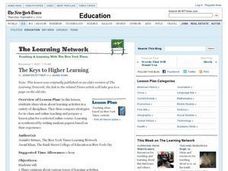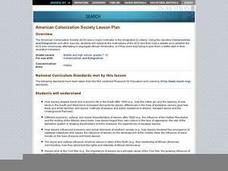Curated OER
Feeling the Heat
Pupils record temperatures at different locations around campus. They examine the results and draw conclusions about how materials and colors affect the amount of heat produced. They also analyze Los Angeles' temperature records over a...
National Endowment for the Humanities
Revolution '67, Lesson 1: Protest: Why and How
To some people, protesting is as American as apple pie, but the factors that lead to protests can be as confusing to veteran activists as to today's youth. Revolution '67 explores the riots in Newark, New Jersey as a case study. Using...
Novelinks
The Good Earth: Concept Analysis
Designed for teachers, this resource provides an overview of Pearl S. Buck's Pulitzer Prize winning novel, The Good Earth. Information about the organizational pattern of the story, issues and themes addressed, historical background on...
Lied Center of Kansas
The Ugly Duckling and The Tortoise and the Hare
Both The Ugly Duckling and The Tortoise and the Hare are great additions to an elementary language arts lesson. Young readers focus on the literary elements of each story, including characters and plot development, and apply counting and...
Mathematics Assessment Project
Middle School Mathematics Test 3
Real-life mathematics is not as simple as repeating a set of steps; pupils must mentally go through a process to come to their conclusions. Teach learners to read, analyze, and create a plan for solving a problem situation. The provided...
Curated OER
The Scarlet Letter and Transcendentalism
Enhance your unit on The Scarlet Letter with a thorough and applicable lesson. Learners use the anchor text in this unit plan that asks them to consider the Transcendental concepts intertwined within Nathaniel Hawthorne's classic tale.
Poetry4kids
Writing Riddles
What's got 60 eyes, 150 fingers, and an endless number of ideas? Your language arts class! Challenge young writers to come up with clever riddles with an online poetry lesson.
Curated OER
Looking for the Dirty Scoop
Students read "The Negative Effects of Urban Sprawl." They discuss the main forms of transportation in their city and conduct research about the development of their community in terms of land use. Students sketch a map of their city and...
Curated OER
Why Is ______ Located Where It Is?
Students discuss the reasons why cities are located where the are. In groups, they identify the physical features that support a city. They determine if those features help or hinder the city to become a major world city. They answer...
Curated OER
If You Build It, Will They Come?
Learners examine the city of Duluth, Minnesota. In groups, they use the internet to discover its current state of urban geography. After their research, they create and plan their own redeveloping of the city. They share their results...
Curated OER
What? No Cars?
Students consider a world in which cars are banned. They work together to develop a sketch of transportation alternatives. They share their ideas with the class.
Curated OER
Chicago's Amazing Growth
Students, in groups, collaboratively explore the rapid growth of Chicago (from 350 to 300,000 in less than 40 years), and how the city changed to accommodate such rapid growth.
Curated OER
Schoolyard Field Guide
Fourth graders observe, plan, research, and create a field guide for the trees that are in their schoolyard. In this trees lesson plan, 4th graders make careful observations of what they see around their school and create a guide.
Curated OER
Land Use Competition
High schoolers represent a specific interest in the business community and present a plan to develop a 4 square mile area into a productive venture that benefit the community.
Curated OER
The Red Studio Shows the Way
Learners look at the painting The Red Studio Shows the Way, and critique the art piece. In this critiquing art lesson plan, students discuss how the painting expresses ideas and feelings and history.
Curated OER
Be Kind to our Earth
Students make a list of ideas on ways we can take care of our Earth and complete a class project planning sheet where they problem solve to help save the Earth. In this Earth lesson plan, students also play a conservation charades game.
Curated OER
Caring for Our environment
Second graders study the environment by reading and discuss information on pollution in the texts. In this environment lesson students read Wicker School Takes Action, and City Green and discuss what we do with our trash. Students...
Curated OER
The Keys To Higher Learning
Students discuss the validity of using the internet for learning. They compare and contrast the various strategies for learning when done online and in class. Students prepare a lesson plan for an online class and write a paper...
Curated OER
Saudi Arabia -- Future city
Seventh graders summarize an article on Masdar. For this summarizing lesson students clearly explain three of the four points provided in an outline of the article. The students write an essay and identify six physical features of the...
Curated OER
Town Development
Young scholars evaluate how the impact of building of towns affected slavery. In this United States History lesson, students work in small groups to construct a map, then they participate in a role-playing activity.
Curated OER
Agriculture in Idaho: Its Importance And Development From Historical Times To the Present
Fourth graders examine importance agriculture is in their own lives and about its importance in the history of Idaho from its beginnings through the present.
Curated OER
Developing Models
Students understand the concept of a scientific model and how it relates to climate change. In this obsesrvation and gathering data lesson students design a trial and error model using PowerPoint.
Curated OER
American Colonization Society Lesson Plan
Students read an article online "Colonization and Emigration" and break into debating groups. They research points that support their side, namely whether or not the American Colonization Society was for or against segregation. They...
Curated OER
Costco and Zoning
Students research zoning laws in the community. They interview city planners to find out necessary steps for approval. Students collect information about facilities being proposed. They write an article on their findings.








